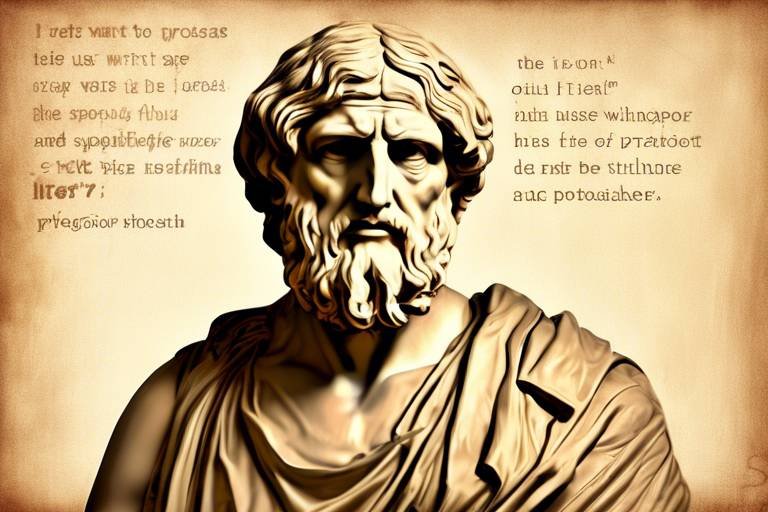Medieval Philosophy in the Teachings of Thomas Aquinas
When we dive into the rich tapestry of medieval philosophy, the name Thomas Aquinas stands out like a beacon of intellectual illumination. Born in the 13th century, Aquinas was not just a philosopher; he was a revolutionary thinker who sought to harmonize the ancient wisdom of Aristotle with the profound truths of Christian theology. Imagine a world where faith and reason were often at odds, and Aquinas stepped in as a bridge, showing that these two realms could coexist in a beautiful, cohesive whole. His teachings have left an indelible mark on Western philosophy, influencing countless thinkers and shaping the discourse around ethics, metaphysics, and the very nature of existence.
Aquinas's philosophical journey was deeply rooted in the historical context of his time. The 13th century was a period of intellectual awakening in Europe, with the rediscovery of ancient texts and a burgeoning interest in human reason. This was not just a backdrop; it was a vibrant landscape filled with debates, conflicts, and a quest for knowledge. Aquinas was influenced by the scholastic method, which emphasized rigorous analysis and debate, allowing him to delve into complex philosophical questions. His ability to weave together various strands of thought—both ancient and contemporary—set him apart as a thinker of remarkable depth and insight.
One of the most significant aspects of Aquinas's philosophy is his integration of Aristotelian thought. Aristotle's works provided Aquinas with a framework to explore metaphysics, ethics, and epistemology. For instance, Aquinas adapted Aristotle's notions of substance and causality, reshaping them to fit within a Christian context. This adaptation wasn't merely a rehashing of old ideas; it was a profound transformation that allowed Aquinas to articulate a vision of the world where God is the ultimate cause and source of all existence. His philosophical inquiries were not just academic exercises; they were deeply intertwined with his faith, leading to a unique synthesis that has captivated scholars for centuries.
At the heart of Aquinas's moral philosophy lies his concept of natural law. He proposed that there are universal moral principles inherent in nature, accessible to human reason. This idea of natural law serves as a guiding framework for ethical behavior, suggesting that humans can discern right from wrong through their rational faculties. In a world that often feels chaotic and morally ambiguous, Aquinas's natural law theory offers a beacon of clarity, reminding us that our moral compass is not solely dictated by societal norms but is rooted in a deeper understanding of the universe.
Moreover, Aquinas's metaphysical ideas, particularly his famous Five Ways to demonstrate the existence of God, are foundational to his philosophy. Each argument presents a different angle on why we can believe in a divine creator, ranging from the observation of motion to the necessity of a first cause. These arguments are not just philosophical musings; they are profound insights that continue to resonate in contemporary discussions about faith and reason. They challenge us to consider the very nature of existence and our place in the cosmos.
As we explore Aquinas's teachings, we see a remarkable interplay between Christian theology and philosophy. Aquinas was a master at reconciling faith with reason, showing that belief in God does not negate rational inquiry but rather complements it. His works encourage us to ask deep questions and seek answers that honor both our intellectual curiosity and our spiritual beliefs. This synthesis is perhaps one of his most enduring legacies, reminding us that the pursuit of truth can take many forms, all leading us closer to a greater understanding of the divine.
In conclusion, Thomas Aquinas's contributions to medieval philosophy are nothing short of monumental. His ability to weave together various philosophical traditions into a cohesive framework has left a lasting impact on both philosophy and theology. As we reflect on his teachings, we are invited to engage with the profound questions of existence, morality, and the nature of God. Aquinas's legacy is a testament to the power of thought and the enduring quest for knowledge that transcends the ages.
- Who was Thomas Aquinas? - Thomas Aquinas was a 13th-century philosopher and theologian known for his integration of Aristotelian philosophy with Christian doctrine.
- What is natural law according to Aquinas? - Natural law is a moral theory that posits certain rights and moral values are inherent in human nature and can be understood through reason.
- What are the Five Ways of Aquinas? - The Five Ways are arguments proposed by Aquinas to demonstrate the existence of God, based on observation and logical reasoning.
- How did Aquinas influence modern philosophy? - Aquinas's synthesis of faith and reason continues to influence contemporary discussions in ethics, law, and human rights.

Historical Context of Aquinas
To truly appreciate the philosophical contributions of Thomas Aquinas, it's essential to step back and examine the rich historical tapestry of the 13th century. This was a time when Europe was a melting pot of ideas, cultures, and religious beliefs, creating a fertile ground for intellectual growth. The medieval period was characterized by a resurgence of interest in classical philosophy, particularly the works of Aristotle, which had been largely forgotten in the chaos of the early Middle Ages.
During Aquinas's lifetime, Europe was witnessing significant transformations. The rise of universities, such as the University of Paris, marked a pivotal shift in education, moving away from monastic schools to institutions that fostered critical thinking and debate. This environment allowed scholars like Aquinas to engage with ancient texts and integrate them with contemporary Christian thought. Aquinas's philosophy did not emerge in a vacuum; it was influenced by various currents:
- Theological Developments: The Church was solidifying its authority, and the relationship between faith and reason was a hot topic. Aquinas sought to harmonize these two realms.
- Political Climate: The 13th century was marked by the rise of nation-states and a growing sense of identity among Europeans, which affected philosophical discourse.
- Cultural Exchange: The Crusades and trade with the East brought new ideas and texts to Europe, enriching the intellectual landscape.
Moreover, the philosophical groundwork laid by earlier thinkers, such as Augustine of Hippo, had a profound impact on Aquinas. Augustine's emphasis on divine illumination and the importance of faith influenced Aquinas's approach to knowledge and ethics. The synthesis of these ideas created a unique philosophical framework that would shape not only Aquinas's own work but also the trajectory of Western philosophy.
Aquinas was also a product of his time in terms of the scholastic method, which emphasized dialectical reasoning and the systematic exploration of questions. This method was instrumental in how he approached his writings, allowing him to dissect complex theological and philosophical issues with clarity and rigor. His works, such as the Summa Theologica, reflect this method, as he often posed objections to his own arguments before addressing them, showcasing a deep understanding of opposing viewpoints.
In summary, the historical context of Aquinas is not just a backdrop; it is a vital component of understanding his contributions to philosophy. The interplay of classical thought, theological inquiry, and the dynamic socio-political environment of the 13th century provided Aquinas with the tools to build a philosophical system that would resonate throughout the ages.

Key Philosophical Influences
Thomas Aquinas was not just a philosopher; he was a bridge between ancient wisdom and medieval thought. His philosophical journey was deeply influenced by various traditions, with Aristotelianism standing out as the most significant. Imagine a world where the ancient teachings of Aristotle were like a treasure chest of ideas, and Aquinas was the skilled craftsman who carefully molded these ideas to fit the intricate design of Christian theology. This melding of philosophy and faith created a robust framework for understanding existence, ethics, and the divine.
Aquinas didn’t merely adopt Aristotle’s ideas; he transformed them. For instance, where Aristotle emphasized empirical observation and reason, Aquinas integrated these concepts with the Christian belief in divine revelation. This synthesis allowed him to explore profound questions about the nature of reality and humanity's place within it. His work became a cornerstone for medieval philosophy, influencing not only his contemporaries but also generations of thinkers who followed.
In addition to Aristotle, Aquinas drew inspiration from other philosophical traditions. The Stoics contributed to his understanding of ethics, particularly the idea that virtue is essential for a fulfilling life. Meanwhile, the Neoplatonists influenced his metaphysical views, especially concerning the nature of being and the divine. This eclectic mix of influences is what makes Aquinas's thought so rich and multifaceted.
To summarize, the key philosophical influences on Aquinas can be categorized as follows:
- Aristotelianism: Provided a framework for understanding nature and existence.
- Stoicism: Contributed to his ethical views, emphasizing virtue.
- Neoplatonism: Influenced his ideas on metaphysics and the divine.
Ultimately, Aquinas's ability to weave these various strands of thought into a cohesive philosophical system is what sets him apart as a towering figure in medieval philosophy. His work not only addressed the intellectual challenges of his time but also laid the groundwork for future philosophical inquiry, making him a pivotal character in the story of Western thought.

Aristotle's Impact
When we talk about the profound influence of Aristotle on Thomas Aquinas, it’s like discussing the roots of a mighty tree that has shaped the landscape of Western philosophy. Aristotle's works provided Aquinas with a rich framework for understanding nature, existence, and the very essence of humanity. Imagine trying to build a house without a solid foundation; that’s how crucial Aristotle’s philosophy was for Aquinas. He didn’t just borrow ideas; he reinterpreted them, weaving them into a tapestry that harmonized with Christian theology.
Aquinas was particularly drawn to Aristotle's emphasis on empirical observation and reason, which stood in contrast to the more mystical approaches of earlier thinkers. By integrating these Aristotelian principles, Aquinas was able to formulate a robust philosophical system that addressed the complexities of existence. He believed that through reason, humans could grasp the divine order of the universe, which was a revolutionary idea for his time. This synthesis of faith and reason became a hallmark of Aquinas's thought, allowing him to argue that both could coexist without conflict.
One of the most significant areas where Aristotle's impact is felt is in Aquinas's metaphysics. Aristotle's concept of substance, for example, became a cornerstone for Aquinas's understanding of God and creation. He adapted Aristotle’s notion of the Prime Mover—the initial cause of all motion in the universe—into his own arguments for the existence of God. Aquinas's famous Five Ways to demonstrate God's existence are deeply rooted in Aristotelian philosophy, showcasing how he transformed these ideas into a theological context.
Furthermore, Aristotle's exploration of ethics greatly influenced Aquinas's moral philosophy. The Aristotelian virtue ethics, which emphasizes the importance of character and the cultivation of virtues, provided Aquinas with a framework to discuss moral behavior. He expanded on Aristotle’s ideas, introducing the concept of natural law—the idea that moral principles are inherent in the nature of humans and can be understood through reason. This was a significant leap, as it bridged the gap between human ethics and divine law, suggesting that understanding our nature leads us closer to understanding God.
In summary, the impact of Aristotle on Aquinas cannot be overstated. It was a relationship that transformed the landscape of medieval philosophy and laid the groundwork for future philosophical inquiry. The dialogue between faith and reason that Aquinas fostered continues to resonate, making his work a vital part of both philosophical and theological discussions today.
- What was Aristotle's main contribution to Aquinas's philosophy? Aristotle's main contribution was his emphasis on reason and empirical observation, which Aquinas integrated into his own theological framework.
- How did Aquinas adapt Aristotle's ideas? Aquinas adapted Aristotle's concepts by reinterpreting them within a Christian context, particularly in metaphysics and ethics.
- What are Aquinas's Five Ways? Aquinas's Five Ways are five arguments for the existence of God that are based on Aristotelian philosophy.
- How does Aristotle's ethics influence Aquinas? Aristotle's virtue ethics influenced Aquinas's moral philosophy, leading him to develop the concept of natural law.

Natural Law Theory
Thomas Aquinas's concept of natural law is a cornerstone of his moral philosophy, and understanding it is like opening a window into his ethical universe. At its core, natural law is the idea that there are inherent moral principles that govern human behavior, which are discoverable through reason and reflection on human nature. Aquinas believed that these principles are not merely arbitrary rules imposed by society or religion; rather, they are grounded in the very essence of human existence and the natural order of the world.
Aquinas posited that natural law is a reflection of God's eternal law, which governs the universe. He argued that human beings, endowed with reason, have the ability to discern these natural laws. This means that moral truths are accessible to all people, regardless of their religious beliefs. In this way, Aquinas sought to bridge the gap between faith and reason, asserting that understanding natural law leads to a more profound appreciation of divine law.
To better grasp Aquinas's natural law theory, it's helpful to consider its main components:
- Objective Morality: Natural law posits that certain actions are inherently right or wrong, independent of human opinion.
- Human Nature: The theory is based on the belief that human beings have specific purposes and inclinations that can be understood through reason.
- Common Good: Natural law emphasizes the importance of the common good, advocating for actions that benefit society as a whole.
One of the most significant implications of natural law theory is its impact on moral decision-making. Aquinas argued that by following natural law, individuals could align their actions with their true purpose, ultimately leading to a flourishing life. This perspective is particularly relevant in contemporary discussions about ethics, as it encourages people to consider not just the legality of their actions, but also their moral implications. For instance, when faced with ethical dilemmas—such as issues surrounding healthcare, environmental responsibility, or social justice—Aquinas's natural law theory provides a framework for evaluating the rightness or wrongness of various choices.
In summary, Aquinas's natural law theory is not just an abstract philosophical concept; it serves as a practical guide for ethical living. By recognizing the inherent moral order of the universe and our place within it, individuals can make decisions that reflect a deeper understanding of both their own nature and the greater good. This enduring relevance of natural law in moral philosophy showcases Aquinas's genius in marrying the insights of ancient philosophy with the tenets of Christian theology, creating a rich tapestry of thought that continues to inspire ethical discourse today.
- What is natural law according to Aquinas?
Natural law, in Aquinas's view, refers to the inherent moral principles that govern human behavior, discoverable through reason and reflection on human nature. - How does natural law relate to divine law?
Aquinas believed that natural law is a reflection of God's eternal law, providing a bridge between faith and reason. - What are the implications of natural law for modern ethics?
Natural law encourages individuals to consider the moral implications of their actions, promoting decisions that align with the common good.

Metaphysics and Existence
When we dive into the philosophical ocean that is Thomas Aquinas's metaphysics, we find ourselves navigating through profound waters filled with questions about existence, reality, and the divine. Aquinas’s metaphysical framework is not merely a set of abstract ideas; it serves as a bridge connecting the tangible world with the divine essence. At the heart of his metaphysical inquiry lies the quest to understand the nature of being itself, which he articulates through his famous Five Ways—five arguments that seek to demonstrate the existence of God.
These Five Ways are crucial for anyone looking to grasp Aquinas's philosophical stance. They are:
- The Argument from Motion: Everything that moves is moved by something else, leading to the necessity of a first mover, which Aquinas identifies as God.
- The Argument from Causation: Every effect has a cause, and there must be an uncaused cause that initiated everything—again pointing to God.
- The Argument from Contingency: Things exist contingently, meaning they could either exist or not exist. There must be a necessary being that causes contingent beings, which Aquinas argues is God.
- The Argument from Degree: There are varying degrees of goodness, truth, and nobility in the world, suggesting the existence of a perfect being that embodies these qualities.
- The Teleological Argument: The order and purpose evident in the universe imply the existence of an intelligent designer—God.
Aquinas’s approach to metaphysics is deeply rooted in Aristotelian thought, yet he seamlessly integrates it with Christian theology. For Aquinas, understanding existence is not just about abstract reasoning; it’s about recognizing the divine presence in every aspect of our lives. He believed that everything in existence has a purpose and that this purpose is ultimately linked to God. In this way, Aquinas offers a holistic view of reality where faith and reason coexist in harmony.
Moreover, Aquinas introduces the concept of esse (to be) and essentia (what it is). He argues that the essence of a being is distinct from its existence. For example, a tree has the essence of being a tree, but its existence is contingent upon various factors like soil, water, and sunlight. This distinction is critical because it leads to the understanding that God is the only being whose essence is existence itself—He is the necessary being that underpins all of reality.
In summary, Aquinas’s metaphysical explorations do not merely serve academic purposes; they invite us to reflect on our own existence and our relationship with the divine. By contemplating these profound questions, we are encouraged to seek deeper truths about ourselves and the universe around us. Aquinas's metaphysics thus remains a cornerstone of philosophical inquiry, urging us to grapple with the complexities of existence in our quest for understanding.
- What are the Five Ways of Aquinas? The Five Ways are arguments that Aquinas presents to demonstrate the existence of God, focusing on motion, causation, contingency, degree, and design.
- How does Aquinas differentiate between essence and existence? Aquinas posits that essence refers to what a thing is, while existence refers to that which makes a thing actual. God is the only being whose essence is existence.
- Why is metaphysics important in Aquinas's philosophy? Metaphysics helps us understand the nature of reality and existence, bridging the gap between philosophical inquiry and theological understanding.

Christian Theology and Philosophy
Thomas Aquinas stands as a monumental figure who masterfully blended Christian theology with the rich tapestry of philosophical inquiry. In an era where faith often clashed with reason, Aquinas emerged as a beacon of harmony, demonstrating that both could coexist and even enrich one another. His approach was revolutionary; instead of viewing faith and reason as adversaries, he presented them as partners in the quest for truth. This synthesis was not merely an academic exercise; it was a profound exploration of the nature of existence, morality, and the divine.
Aquinas believed that while faith provides the foundational truths of Christianity, reason serves as a tool to understand and articulate these truths. He posited that God endowed humans with the capacity for reason, enabling them to explore the world and their faith in a meaningful way. This perspective is beautifully encapsulated in his famous quote, “Grace does not destroy nature, but perfects it.” In essence, Aquinas argued that the natural world, understood through reason, could lead one to a deeper understanding of God.
To illustrate his views, Aquinas developed a framework that encompassed various aspects of theology and philosophy. He categorized knowledge into two realms: theoretical and practical knowledge. Theoretical knowledge dealt with understanding God and the universe, while practical knowledge focused on moral actions and ethical living. This duality allowed Aquinas to address both the metaphysical questions of existence and the ethical dilemmas faced by individuals in their daily lives.
One of the most significant contributions of Aquinas to the intersection of theology and philosophy is his concept of Natural Law. According to Aquinas, natural law is a reflection of God's eternal law, accessible to human reason. He argued that by observing the natural world and using reason, individuals could discern moral truths that align with divine will. This understanding of natural law has profound implications for ethics, as it suggests that moral principles are not arbitrary but rooted in the very fabric of existence.
Moreover, Aquinas's arguments for the existence of God, known as the Five Ways, serve as a cornerstone of his philosophical theology. These arguments, which include the proofs from motion, causation, contingency, perfection, and teleology, provide a rational basis for belief in God. They show that faith is not blind but can be supported by logical reasoning. This integration of faith and reason has influenced countless theologians and philosophers, fostering a tradition of inquiry that continues to thrive today.
In summary, Aquinas's work exemplifies the profound relationship between Christian theology and philosophy. His ability to weave together these two domains not only enriched medieval thought but also laid the groundwork for future philosophical discourse. By advocating for a harmonious relationship between faith and reason, Aquinas encouraged individuals to seek understanding and truth in both their spiritual and intellectual pursuits.
- What is the significance of Aquinas's Five Ways?
Aquinas's Five Ways are essential arguments that aim to demonstrate the existence of God through logical reasoning, bridging the gap between faith and philosophy. - How does Aquinas define natural law?
Aquinas defines natural law as the moral principles inherent in human nature, accessible through reason and reflective of God's eternal law. - Why is the integration of faith and reason important?
This integration allows individuals to explore their beliefs more deeply, fostering a comprehensive understanding of both their faith and the world around them.

Ethics and Moral Philosophy
When we dive into the world of Thomas Aquinas, we find ourselves exploring a rich tapestry of ethical thought that is as intricate as it is profound. Aquinas's moral philosophy is deeply rooted in the concept of virtue ethics, which emphasizes the importance of character and the virtues that make up a good life. Rather than merely focusing on rules or consequences, Aquinas invites us to consider what it means to be a good person, and how our actions align with our ultimate purpose as human beings.
At the heart of Aquinas's ethical framework lies the idea that virtues are essential for achieving moral excellence. He categorizes virtues into two main types: cardinal virtues and theological virtues. The cardinal virtues—wisdom, courage, temperance, and justice—serve as the foundation for all other virtues and guide our actions in everyday life. Meanwhile, the theological virtues—faith, hope, and charity—connect us to the divine and help us navigate our spiritual journey. Understanding these virtues is crucial, as they not only shape our character but also influence our decisions and interactions with others.
Aquinas believed that human beings are inherently social creatures, and our moral development is deeply intertwined with our relationships. This is where reason plays a pivotal role in his ethical philosophy. According to Aquinas, reason is a gift that allows us to discern right from wrong and to understand the moral law that governs our actions. He posits that by using our reason, we can align our lives with the natural law, which reflects God's eternal law. This alignment is not just about following rules; it’s about striving for a life that embodies the virtues that Aquinas espoused.
Moreover, Aquinas's ethical theories are not just relics of the past; they possess a remarkable relevance in today's world. Consider the complex moral dilemmas we face in contemporary society—issues such as bioethics, human rights, and environmental ethics. Aquinas's virtue ethics provides a framework for addressing these challenges by encouraging us to focus on character and the common good rather than merely the outcomes of our actions. For instance, in discussions about medical ethics, Aquinas’s emphasis on the virtue of compassion can guide healthcare professionals in making decisions that prioritize patient dignity and well-being.
To illustrate Aquinas's ethical framework, let’s take a closer look at the virtues he emphasized:
| Virtue Type | Examples | Significance |
|---|---|---|
| Cardinal Virtues | Wisdom, Courage, Temperance, Justice | Foundation for moral behavior and decision-making |
| Theological Virtues | Faith, Hope, Charity | Connects human beings to the divine and enriches spiritual life |
In conclusion, Aquinas's ethics challenges us to cultivate virtues that not only enhance our character but also improve our society. By focusing on the moral implications of our actions and the virtues that guide them, we can navigate the complexities of life with a sense of purpose and integrity. So, the next time you face a moral dilemma, remember Aquinas's teachings and ask yourself: What kind of person do I want to be, and how can my actions reflect that?
- What are the cardinal virtues according to Aquinas? The cardinal virtues are wisdom, courage, temperance, and justice, which serve as the foundation for moral behavior.
- How does Aquinas's virtue ethics apply to modern issues? Aquinas's virtue ethics emphasizes character and the common good, providing a framework for addressing contemporary moral dilemmas.
- What role does reason play in Aquinas's moral philosophy? Reason is essential for discerning right from wrong and aligning actions with natural law.

Virtue Ethics Explained
When we talk about virtue ethics, we're diving into a rich tapestry of moral philosophy that Thomas Aquinas championed during the medieval period. At its core, virtue ethics revolves around the idea that the key to a good life lies not merely in following rules or calculating consequences, but in cultivating good character traits, or virtues. Aquinas believed that virtues are essential for achieving moral excellence and that they guide individuals in making ethical decisions. But what exactly are these virtues?
Aquinas distinguished between two main categories of virtues: cardinal virtues and theological virtues. The cardinal virtues—prudence, justice, fortitude, and temperance—are foundational traits that help individuals navigate moral challenges. These virtues can be developed through practice and are essential for leading a balanced and ethical life.
On the other hand, the theological virtues—faith, hope, and charity—are directly related to one's relationship with God. Aquinas argued that these virtues elevate human experience and provide a deeper understanding of our purpose. By integrating both sets of virtues, Aquinas laid the groundwork for a comprehensive ethical framework that emphasizes the significance of character in moral decision-making.
To illustrate how these virtues operate in real life, consider the following examples:
- Prudence might guide someone to think carefully before making a significant financial investment.
- Justice could compel an individual to advocate for the rights of others in their community.
- Fortitude may inspire a person to stand up against injustice, even when it is difficult.
- Charity encourages selfless acts, reminding us to care for those in need.
Aquinas also emphasized that virtues are interconnected and that developing one virtue can enhance others. For instance, a person who practices temperance in their personal habits may find it easier to exercise fortitude in challenging situations. This holistic approach to ethics reflects Aquinas's belief that a virtuous life leads to true happiness, or eudaimonia, which is the ultimate goal of human existence.
In summary, Aquinas's virtue ethics invites us to focus on becoming better people rather than merely adhering to a set of rules. By cultivating virtues, we not only improve ourselves but also contribute positively to society. This perspective remains relevant today, as individuals grapple with moral dilemmas in a complex world. So, the next time you face a tough decision, ask yourself: What kind of person do I want to be?
- What are the cardinal virtues according to Aquinas? The cardinal virtues are prudence, justice, fortitude, and temperance, which serve as foundational traits for ethical behavior.
- How do theological virtues differ from cardinal virtues? Theological virtues—faith, hope, and charity—are related to one's relationship with God, while cardinal virtues are more about practical moral living.
- Why is virtue ethics important? Virtue ethics emphasizes character development and moral excellence, guiding individuals to make ethical decisions based on who they aspire to be.

Application of Ethics
The ethical theories proposed by Thomas Aquinas are not merely historical artifacts; they are vibrant frameworks that continue to guide moral reasoning in today's complex world. His emphasis on virtue ethics, which focuses on the character of the moral agent rather than just the consequences of actions, offers a refreshing perspective in an age often dominated by utilitarian calculations. Aquinas believed that to live a good life, one must cultivate virtues, which are habits that enable individuals to act in accordance with reason and moral goodness.
In practical terms, Aquinas's ethics can be applied to a variety of contemporary dilemmas, ranging from bioethics to environmental ethics. For instance, consider the ethical challenges posed by advancements in medical technology. Issues such as euthanasia, genetic engineering, and organ donation present moral questions that require a nuanced understanding of human dignity and the common good. Aquinas would encourage us to reflect on the virtues of compassion, justice, and temperance as we navigate these complex issues.
Moreover, Aquinas's notion of natural law plays a vital role in discussions about human rights. He posited that natural law is accessible through human reason and reflects the moral order inherent in the world. This idea supports the argument that certain rights are universal and should be upheld regardless of cultural or societal differences. In this sense, Aquinas's ethical framework provides a solid foundation for advocating for justice and equality in the modern world.
To illustrate the application of Aquinas's ethics, let’s consider a few modern scenarios:
- Medical Ethics: In cases of medical treatment, Aquinas would urge healthcare professionals to prioritize the virtues of benevolence and prudence, ensuring that patient care aligns with moral principles.
- Environmental Responsibility: When addressing climate change, Aquinas’s emphasis on stewardship can guide individuals and corporations to act responsibly towards creation, promoting sustainability and respect for nature.
- Social Justice: In discussions around poverty and inequality, Aquinas’s focus on the common good encourages policies that support the most vulnerable members of society.
In summary, the application of Aquinas's ethical theories is not confined to academic discourse; they resonate deeply with pressing issues we face today. By grounding our moral decisions in virtue and the pursuit of the common good, we can navigate the complexities of modern life with a clearer moral compass.
1. How does Aquinas's ethics differ from other ethical theories?
Aquinas's ethics is rooted in virtue ethics, emphasizing character and moral virtues rather than just the consequences of actions or adherence to rules, as seen in consequentialism and deontology.
2. Can Aquinas's natural law theory be applied in a secular context?
Yes, Aquinas's natural law theory posits that moral truths can be discerned through human reason, making it applicable in secular discussions about ethics and human rights.
3. How are Aquinas's teachings relevant to modern bioethics?
Aquinas's emphasis on human dignity and the common good provides a moral framework for navigating complex bioethical issues, encouraging a focus on virtues like compassion and justice.
4. What role do virtues play in Aquinas's ethical framework?
Virtues are central to Aquinas's ethics; they are habits that enable individuals to act morally and achieve eudaimonia, or a flourishing life, through the practice of good actions.

Aquinas's Legacy
Thomas Aquinas's legacy is nothing short of monumental, echoing through the corridors of philosophy and theology long after his time. His work not only laid the groundwork for **Scholasticism** but also bridged the gap between **faith** and **reason**, creating a robust framework that continues to influence contemporary thought. Imagine a towering tree; the roots of Aquinas's ideas run deep into the soil of medieval philosophy, while its branches reach out to touch modern discussions on ethics, morality, and human rights.
One of the most significant aspects of Aquinas's legacy is his method of inquiry, which emphasized the importance of logical reasoning in understanding both divine truths and natural laws. This approach was revolutionary for his time and has inspired countless scholars. To illustrate this, consider the following table that outlines key aspects of his influence:
| Aspect | Description |
|---|---|
| Scholasticism | Aquinas is often seen as the father of Scholasticism, a method of critical thought which dominated medieval universities. |
| Natural Law | His principles of natural law have influenced legal and ethical theories, emphasizing that morality is rooted in human nature. |
| Integration of Faith and Reason | Aquinas demonstrated how faith and reason can coexist harmoniously, a concept that remains central to many theological discussions today. |
Aquinas's influence on **Scholasticism** cannot be overstated. His methods encouraged rigorous debate and analysis, leading to a flourishing of intellectual activity in medieval Europe. This period saw the rise of universities, where scholars engaged with Aquinas's texts, dissecting his arguments and applying them to various fields of study. His synthesis of Aristotelian philosophy with Christian theology provided a rich soil for future thinkers to cultivate their ideas.
Moreover, Aquinas's impact stretches into modern times, where his thoughts on ethics and morality continue to resonate. For instance, contemporary debates surrounding **human rights**, **law**, and **social justice** often reference his natural law theory, which posits that certain rights are inherent to human nature and can be understood through reason. This idea serves as a foundation for many legal systems and ethical frameworks around the world.
In essence, Aquinas's legacy is a testament to the enduring power of ideas. His ability to merge philosophical inquiry with theological principles has left an indelible mark on both disciplines. As we navigate the complexities of modern life, the wisdom of Aquinas offers a guiding light, reminding us that the pursuit of truth is not just an academic endeavor but a vital part of our human experience.
- What is the significance of Aquinas in philosophy?
Aquinas is significant because he integrated **Aristotelian philosophy** with **Christian theology**, creating a framework that influenced both medieval and modern thought. - How did Aquinas contribute to ethics?
Aquinas contributed to ethics through his **natural law theory**, which emphasizes that moral principles are inherent in human nature and accessible through reason. - What is Scholasticism?
Scholasticism is a method of critical thought that emerged in medieval universities, characterized by rigorous dialectical reasoning, largely influenced by Aquinas's works. - How are Aquinas's ideas relevant today?
His ideas are relevant in contemporary discussions on ethics, law, and human rights, providing a philosophical foundation for many modern legal systems.

Influence on Scholasticism
Thomas Aquinas stands as a monumental figure in the realm of Scholasticism, a medieval school of thought that sought to reconcile faith with reason. His methodologies and ideas did not merely contribute to this intellectual tradition; they fundamentally shaped its trajectory. Scholasticism emerged as a response to the complex questions posed by theology, philosophy, and the natural sciences during the Middle Ages, and Aquinas's works provided a structured approach to these inquiries.
Aquinas's approach involved a rigorous analysis of texts, particularly those of Aristotle, which he interpreted through a Christian lens. This synthesis of classical philosophy and Christian doctrine became a hallmark of Scholastic thought. His seminal works, such as the Summa Theologica and the Summa Contra Gentiles, exemplify his method of addressing theological questions through logical reasoning and philosophical inquiry.
One of the key features of Aquinas's influence on Scholasticism is his use of the dialectical method. This method involves posing a question, presenting arguments for and against, and then arriving at a conclusion that harmonizes the differing viewpoints. This approach not only fostered critical thinking but also encouraged scholars to engage with opposing ideas, leading to a richer understanding of complex issues. The dialectical method became a foundational element in the curriculum of medieval universities, where Scholasticism flourished.
Moreover, Aquinas's emphasis on the importance of natural law further solidified his impact on Scholasticism. He argued that moral principles could be discerned through human reason and that these principles were in harmony with divine law. This concept of natural law laid the groundwork for later discussions on ethics and morality within the Scholastic framework, influencing figures such as Duns Scotus and William of Ockham.
To illustrate Aquinas's influence on Scholasticism, consider the following table that outlines key contributions and their effects:
| Contribution | Description | Impact on Scholasticism |
|---|---|---|
| Dialectical Method | A method of inquiry that involves questioning and debating opposing viewpoints. | Encouraged critical thinking and a balanced approach to philosophical and theological issues. |
| Natural Law Theory | The idea that moral principles can be understood through reason. | Influenced ethical discussions and established a framework for moral philosophy. |
| Integration of Faith and Reason | Aquinas's synthesis of Aristotelian philosophy with Christian theology. | Set a precedent for future scholars to explore the relationship between faith and rational thought. |
In essence, Aquinas's contributions to Scholasticism were not just academic; they represented a paradigm shift in how scholars approached the relationship between faith, reason, and morality. His legacy continues to resonate in contemporary philosophical discussions, reminding us of the enduring power of dialogue and inquiry in the pursuit of truth.
- What is Scholasticism? Scholasticism is a medieval school of thought that emphasizes the use of reason to understand faith and theology.
- How did Aquinas influence modern philosophy? Aquinas's integration of Aristotelian thought with Christian theology laid the groundwork for many modern philosophical discussions on ethics and metaphysics.
- What is the dialectical method? The dialectical method is a form of inquiry that involves presenting opposing arguments to arrive at a reasoned conclusion.
- Why is natural law important in Aquinas's philosophy? Natural law is important because it suggests that moral principles can be understood through human reason, bridging the gap between divine law and human ethics.

Modern Relevance
The teachings of Thomas Aquinas continue to resonate in today's world, transcending the boundaries of time and culture. His philosophical insights have not only shaped the landscape of medieval thought but also laid the groundwork for contemporary discussions in ethics, law, and human rights. Imagine walking through a vast library filled with ancient texts, and among them, Aquinas's work stands out like a beacon, guiding scholars and thinkers as they navigate the complexities of modern dilemmas.
One of the most significant contributions of Aquinas to modern philosophy is his approach to ethics, particularly through the lens of virtue ethics. In a world often dominated by consequentialist thinking, where the end justifies the means, Aquinas reminds us that the journey toward moral excellence is just as important as the destination. His emphasis on the cardinal virtues—prudence, justice, fortitude, and temperance—alongside the theological virtues of faith, hope, and charity, provides a robust framework for individuals seeking to live a good life. This is particularly relevant in today's society, where ethical decision-making is frequently challenged by rapid technological advancements and complex moral issues.
Aquinas's ideas extend beyond personal ethics into the realm of political philosophy and law. His concept of natural law serves as a foundation for understanding human rights and moral legislation. In an age where legal systems are often questioned for their fairness and justice, Aquinas's belief that laws should reflect moral truths offers a compelling argument for the integration of ethical considerations in legal frameworks. For instance, the notion that certain rights are inherent and not granted by governments aligns with modern human rights discourse, making Aquinas's work a vital part of current debates on justice and equality.
Furthermore, in the context of bioethics, Aquinas's principles can be applied to contemporary issues such as medical ethics, euthanasia, and genetic engineering. His belief in the sanctity of human life and the importance of intention in moral actions provides a critical lens through which to evaluate these complex topics. As society grapples with the implications of scientific advancements, Aquinas's teachings encourage a balanced approach that respects both human dignity and the pursuit of knowledge.
In education, Aquinas's method of integrating faith and reason offers a model for modern pedagogical approaches. As students are encouraged to explore philosophical questions and ethical dilemmas, Aquinas's synthesis of theology and philosophy serves as a reminder that the pursuit of truth often requires an open mind and a willingness to engage with diverse perspectives. This is particularly important in an increasingly polarized world, where dialogue and understanding are essential for social cohesion.
In summary, the relevance of Thomas Aquinas in the modern world is undeniable. His insights into ethics, law, and education provide valuable guidance as we navigate the complexities of contemporary life. By revisiting his teachings, we can find a path that honors both our moral obligations and our quest for knowledge, ensuring that the legacy of this medieval philosopher continues to illuminate our way forward.
- What is the significance of Aquinas's natural law theory in modern ethics?
Aquinas's natural law theory emphasizes that moral principles are inherent in human nature and can guide ethical decision-making in various contemporary contexts. - How does Aquinas's philosophy influence modern discussions on human rights?
His belief in inherent human dignity and natural rights provides a philosophical foundation for contemporary human rights movements. - Can Aquinas's virtue ethics be applied in today's workplace?
Yes, his emphasis on character development and moral virtues can foster a more ethical workplace culture, guiding individuals toward responsible decision-making. - How does Aquinas reconcile faith and reason?
He argues that faith and reason are complementary, with reason helping to understand and articulate faith-based beliefs.
Frequently Asked Questions
- What is the significance of Thomas Aquinas in medieval philosophy?
Thomas Aquinas is a towering figure in medieval philosophy, known for his synthesis of Aristotelian thought with Christian theology. His work laid the groundwork for much of Western philosophy, and he is often credited with establishing a framework that harmonizes faith and reason, which continues to influence philosophical discourse today.
- How did Aristotle influence Aquinas's philosophy?
Aquinas was profoundly influenced by Aristotle, adopting many of his concepts to develop his own philosophical ideas. He utilized Aristotelian logic and metaphysics to explain Christian doctrines, particularly in areas like ethics and the nature of existence. This integration helped bridge the gap between ancient philosophy and medieval thought.
- What is Aquinas's concept of natural law?
Aquinas's natural law theory posits that moral principles are inherent in human nature and can be understood through reason. He believed that these laws reflect God's eternal law and guide human behavior towards the common good. This concept has significant implications for ethics and moral philosophy.
- What are the Five Ways of Aquinas?
The Five Ways are Aquinas's arguments for the existence of God, presented in his work "Summa Theologica." They include the arguments from motion, causation, contingency, perfection, and teleology. Each argument provides a different perspective on why belief in God is rational and necessary, forming a cornerstone of his metaphysical thought.
- How does Aquinas reconcile faith and reason?
Aquinas believed that faith and reason are complementary rather than contradictory. He argued that reason can lead us to certain truths about God and morality, while faith provides insights that transcend human understanding. This balance allows for a more profound exploration of theological doctrines through philosophical inquiry.
- What is virtue ethics according to Aquinas?
Aquinas's ethical framework is rooted in virtue ethics, emphasizing the importance of character and moral virtues in achieving a good life. He identified cardinal virtues (prudence, justice, fortitude, and temperance) and theological virtues (faith, hope, and charity) as essential for moral excellence and fulfillment of human purpose.
- How are Aquinas's ethical theories relevant today?
Aquinas's ethical theories continue to resonate in contemporary discussions about morality, law, and human rights. His emphasis on virtue ethics encourages a focus on character and moral development, providing a valuable perspective for addressing modern dilemmas and fostering ethical decision-making.
- What is Aquinas's legacy in philosophy and theology?
Aquinas's legacy is immense, influencing not only medieval scholasticism but also modern philosophical and theological thought. His methods and ideas have shaped subsequent scholars and continue to be studied and applied in various fields, demonstrating the enduring relevance of his contributions to philosophy.
- In what ways did Aquinas influence later scholars?
Aquinas is often regarded as a pivotal figure in the development of Scholasticism. His systematic approach to theology and philosophy inspired later thinkers, encouraging a rigorous method of inquiry that combined logic with theological reflection, which was foundational for the evolution of medieval and modern thought.
- Why should we study Aquinas today?
Studying Aquinas today provides valuable insights into the interplay between faith and reason, ethics, and the nature of existence. His work challenges us to think critically about moral issues, the foundations of our beliefs, and the complexities of human nature, making his teachings relevant for anyone interested in philosophy, theology, or ethics.



















